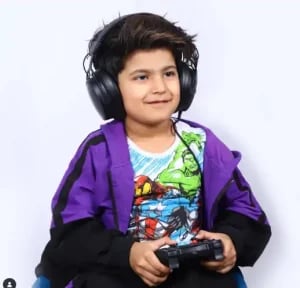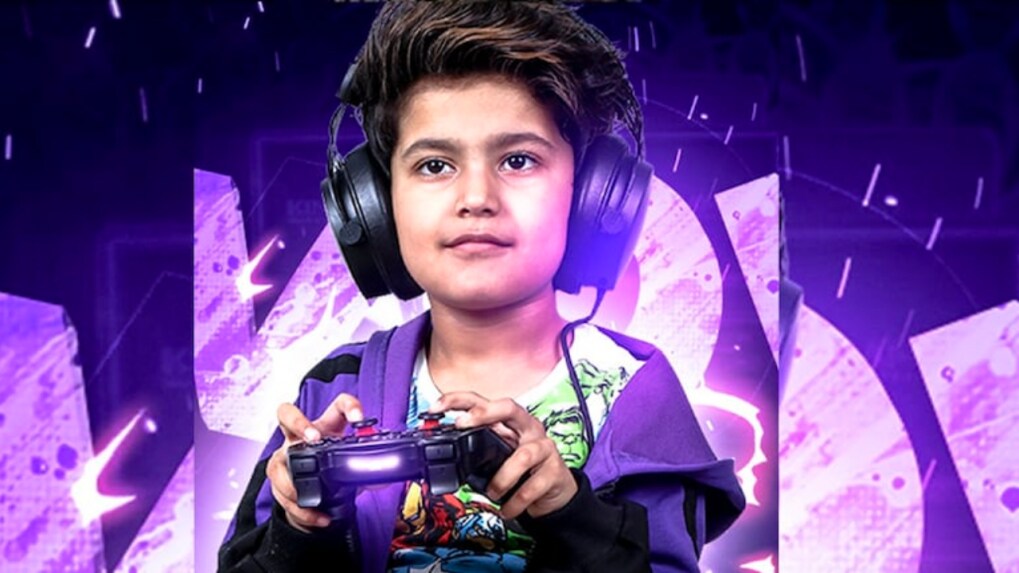Meet the 7-year-old Indian gaming influencer, VivOne
The first-standard student and gamer VivOne is being approached by brands every day. Here's a peek into the life of the young gamer.
ADVERTISEMENT
At seven, what game did you play? Ludo or hide and seek, perhaps? And what is it that you got if you won? Maybe a chocolate bar? Understandable if you are a '90s kid. But this is 2022 and the games have changed and so have the rewards.
Akarsh Chaudhary aka Vivone, one of the youngest online gamers in India, is offered up to a lakh for two to three video collaborations of his gaming content.
A seven-year-old from Mumbai, Vivone has a schedule like every other kid in his neighborhood: it includes homework, meeting friends, swimming lessons, etc. What is different about his day is the three hours in the afternoon that he spends gaming online. He plays BGMI, Valorant, Call of Duty: Warzone, CODM, Pokémon UNITE and others, and also streams his content on YouTube and gaming streaming platform Rooter.
Vivone has a 56.3K followers on Instagram, 3.73 lakh subscribers on YouTube and 22,000 followers on Rooter.
His father, Vivek Chaudhary, is focusing on sharpening Vivone’s skill and not looking for monetization options at the moment. Chaudhary senior, who used to paly video games himself, says he wants Vivone to set an example for how online gaming can become a career and how, like every other traditional athlete, an online gamer can also represent their country at international tournaments.
Getting brand attention and life lessons
Chaudhary and Vivone’s new streaming platform partner Rooter are, however, flooded with offers. From gadget brands to fantasy apps and even some FMCG brands are willing to offer up to a lakh for a video collaboration. What do they get in return? They get what every modern-day marketer is looking for. Reach, access and attention, and rub-off from influencer to brand.
Some of the streaming videos on YouTube have touched 24 lakh views, making Vivone a brand favorite in the segment. Content creators with a follower base like Vivone's can earn up to Rs 5 lakh a month from just streaming.
But is all of this too overwhelming for a seven-year-old? We wonder. For Vivone it isn’t, the family tells us. His parents think that balance is the most important factor, and once someone perfects that, there is no need to worry.
“Vivone does game streaming for three hours in a day. This has been his routine ever since he was five. He knows he cannot game for more than that time and he has other things like swimming and football to look forward to. It is important for gamers too to have other hobbies so that they are not consumed with their gaming gadgets all day,” says his father.
Vivone also seems to be picking up life lessons from gaming.
His father tells us that it has taught Vivone to deal with down phases: “Gaming has taught him that you win some and you lose some.”
Not child's play
Balancing like Chaudhary mentioned is an important parameter. According to ‘Science, translated’, a science-based international publication, the term “problematic gamers” was coined to describe those who habitually spend long hours playing video games.
While the piece on ‘The effects of video games on children’s mental health and psychosocial behavior’ talks about the problems of excessive gaming, it also highlights the possibility of positive effects on an individual’s psychosocial well-being. It shows how a lot of games can boost the psychosocial development of a child by promoting interaction, confidence and also the ability to deal with failure.
While Vivone is living every child’s dream of dedicated screen time and gaming hours, he is being flooded with offers from esports organizations to be a streaming partner.
The kid, however, is untouched by the burden of monetization. He just enjoys playing his games and his cute comments while streaming add that extra touch, making the content popular among fans and brands.

Seven-year-old gamer's ambition
Esports is exactly how sports was 20 years back, says Piyush Kumar, founder and CEO at game streaming platform Rooter. “Two decades back, people were always sceptical about dedicated practice hours because that would hamper their focus on career plans, but then the whole sports scene changed when the market for sports opened up. IPL came in and so did so many other opportunities. Esports will not take 20 years to change the way people think,” he says.
According to Kumar, in a couple of years, players will make the country proud internationally and it will become a sought-after career,” he says.
But there are challenges. Gaming and video games in general are still seen as recreational and too much of it is seen as detrimental, especially for young players and children. However, things are changing with initiatives to organize and new regulations being ushered in.
Gaming is a state subject and various stakeholder bodies are trying to have the industry regularized centrally to bring about uniformity. That apart, there is already a set of guidelines that gaming companies have to follow while pushing out marketing communications.
As Vivone signs off, we ask him what his favourite games are. "Valorant and BGMI are my favourite games,” he says.
And what does he want to be when he grows up? Spoiler alert - A professional gamer.
He tells Storyboard18, “I want to be known internationally, and my parents tell me in another twelve years, when I’m sixteen, I can represent India at global tournaments."

